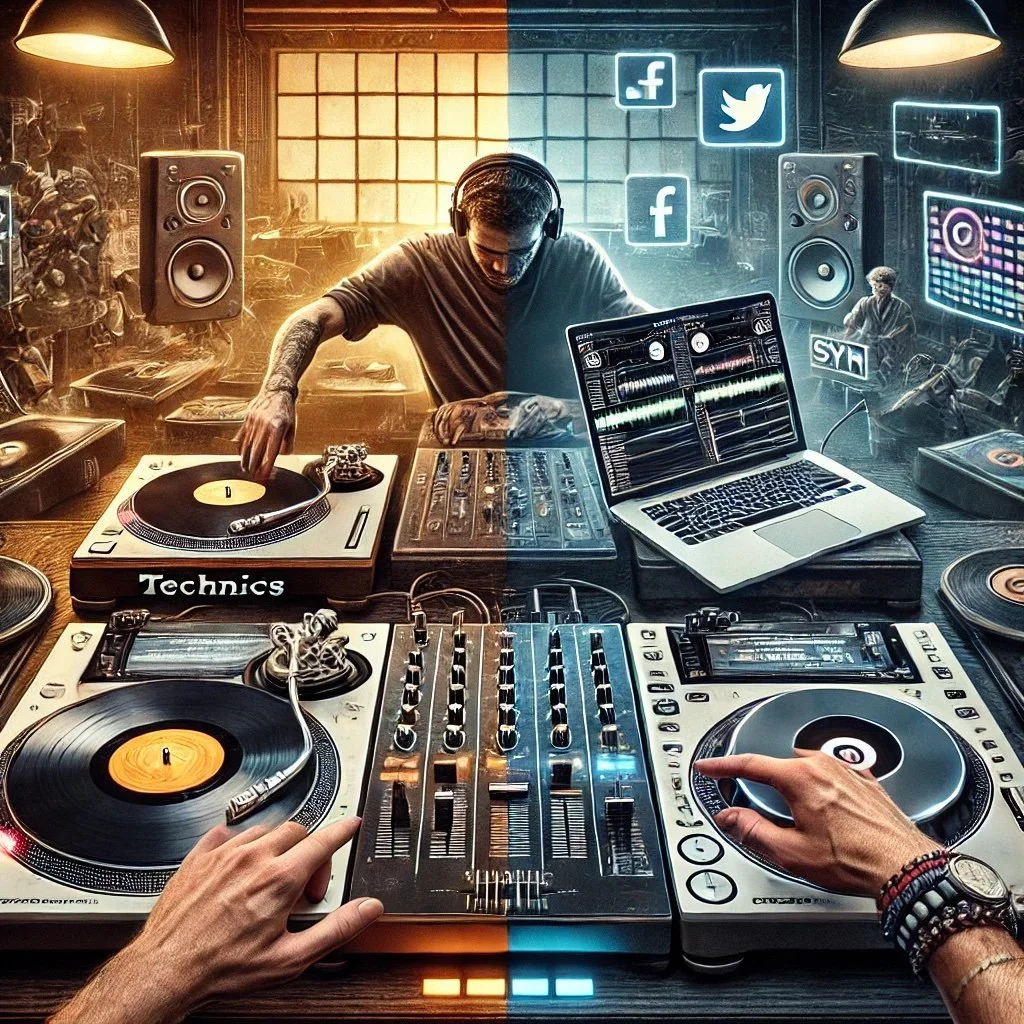How Digital DJing Has Eroded the Art of DJing: The Turntable vs. Controller Debate
DJing has evolved from its early days with turntables like Technics, Stanton, and Numark, where DJs prided themselves on their skills with vinyl records, into a scene dominated by digital setups. For many veteran turntable DJs, this shift feels like a betrayal. They view digital DJing, particularly the reliance on CDJs, controllers, and features like the Sync button, as an erosion of the true craft that defined their art.
One major reason turntable DJs feel this sense of betrayal is that digital DJs, often using software and automatic tools, are receiving more gigs. Why? It’s not always because of their skill on the decks—it’s often because they have more time to invest in marketing themselves on social media. Being a DJ today requires more than just musical talent. It requires a brand. Digital DJs, with their slick setups and automated features, have the luxury of time. They’re not bogged down by the manual techniques turntable DJs had to master, like beatmatching, scratching, and mixing. Instead, they can focus on creating social media content, networking, and promoting themselves online, which lands them more gigs.
The Financial Cost of Being a DJ in the Digital Era
For modern DJs, success is increasingly about the investments they make in self-promotion and technology. It’s no longer enough to be a master of your craft; you need to be constantly visible online. This shift has made DJing more about the business of marketing than ever before. Turntable DJs who spent years honing their skills on vinyl—investing in Technics SL-1200s, for example—now face not just the cost of their equipment but the pressure to maintain an active online presence. This means paying for video content, photographers, social media ads, and sometimes even publicists to stay relevant in an oversaturated market.
The cost of digital DJing setups has also skyrocketed. Today, top-tier digital equipment like Pioneer CDJs, controllers, and laptop DJ software require heavy financial investment. But for many, the most valuable commodity is time. Digital DJs, with the help of automation and software, often find they have more time to invest in building their personal brand, making them more competitive in securing gigs.
The Sync Button: Making DJs Lazy?
The rise of the Sync button on digital controllers is one of the most controversial elements in the debate between traditional and digital DJing. In the era of vinyl, beatmatching—a fundamental DJ skill—took years to master. It required finely tuned ears and constant practice. But with the Sync button, this skill is automated. Some argue this has made modern DJs “lazy,” as they no longer need to develop the ear for beatmatching or even understand how it works. As a result, the artistry that once defined DJing is being lost.
Turntable DJs argue that true mastery of the decks involves understanding the nuances of music—something that automation can never replicate. By relying on software, digital DJs are missing out on the deeper, tactile connection to music that vinyl demands.
The Ghost Production Issue: Are DJs Even Making Their Own Music?
Another problem that has surfaced in the digital age is the issue of ghost production. Many top-tier mainstream DJs don’t even produce the tracks they play in their sets, yet they rarely give proper credit to the music producers who make those tracks. This has caused frustration within the DJ community, particularly among producers who feel exploited. While these producers create the beats that make DJ sets memorable, it’s often the DJs who receive all the fame and financial rewards.
Richie Hawtin, a techno pioneer, has been vocal about the need for more transparency and fairness in the DJ industry. He has openly criticized how certain top-tier DJs earn massive sums without acknowledging or compensating the producers who actually craft the music they play. Hawtin was a major supporter of Aslice, a platform designed to help address this imbalance by allowing DJs to share part of their performance fees with the producers whose tracks they played. However, despite its promise, Aslice recently shut down, in part due to the lack of participation from many top DJs, leaving producers in the shadows once again .
Hawtin expressed his deep disappointment with the closure of Aslice, pointing out that it was a missed opportunity for the industry to correct its economic disparities. Aslice had helped many producers receive their first-ever payments for their work, proving that fair revenue sharing was possible. The platform had facilitated over $400,000 in payments to producers, yet it couldn’t survive due to a lack of buy-in from some of the biggest DJs in the industry .
Turntables vs. CDJs: Should Turntable DJs Feel Superior?
In a way, the divide between turntable DJs and digital DJs mirrors the divide between classic car enthusiasts and modern electric car owners. Imagine the owner of a 1967 Mustang GT500 Eleanor, meticulously maintaining their car and relishing the raw power of its engine. Now, compare that to the owner of a Tesla, who enjoys the luxury of autopilot and the latest tech features. The Mustang owner might argue that driving a manual, high-performance car requires more skill and offers a more rewarding experience. In the same way, turntable DJs argue that spinning vinyl requires a deep, tactile connection with the music—something digital DJing can’t replicate.
Should turntable DJs feel superior? Maybe not superior, but certainly proud. They’ve mastered a craft that involves more than just pressing buttons. They’ve developed an ear for music, a set of hands-on skills, and an understanding of rhythm that takes years to build. In contrast, digital DJs might be seen as technicians who rely on technology to fill in the gaps in their skill set. But it’s important to note that each approach has its place. While turntable DJs prioritize craftsmanship, digital DJs prioritize efficiency and innovation.
Conclusion: The Future of DJing
As technology continues to reshape the DJ landscape, the balance between art and convenience will remain a point of contention. While digital tools offer new creative possibilities, they also risk diluting the essential skills that once defined DJing as an art form. For turntable DJs, the rise of digital DJing feels like a betrayal—a shift away from the hard-earned mastery that vinyl represents. And with the closure of platforms like Aslice, the future looks even bleaker for the producers who often go unrecognized for their contributions.
Ultimately, the DJ scene is at a crossroads. If the industry doesn’t address these issues—whether it’s the economic disparities between DJs and producers or the over-reliance on technology—the true art of DJing could be at risk of fading into the background.




